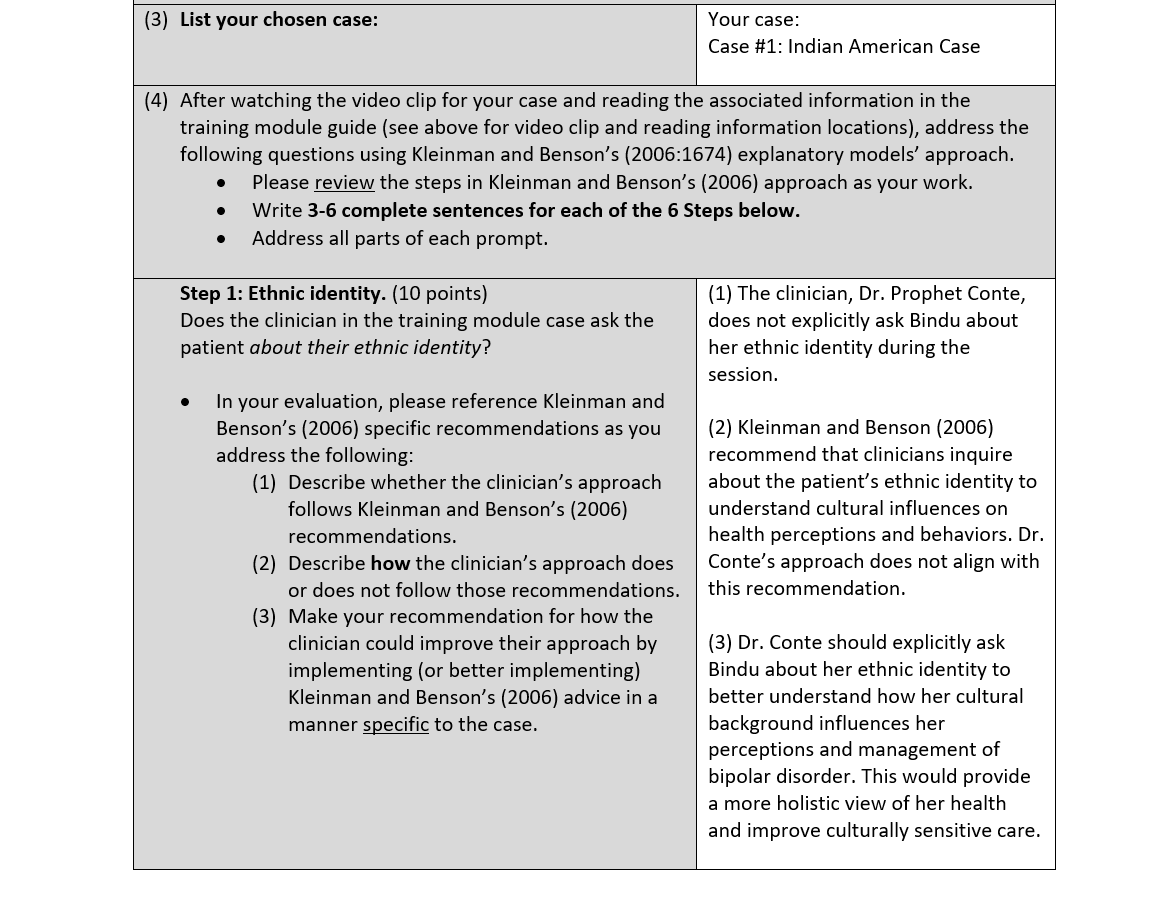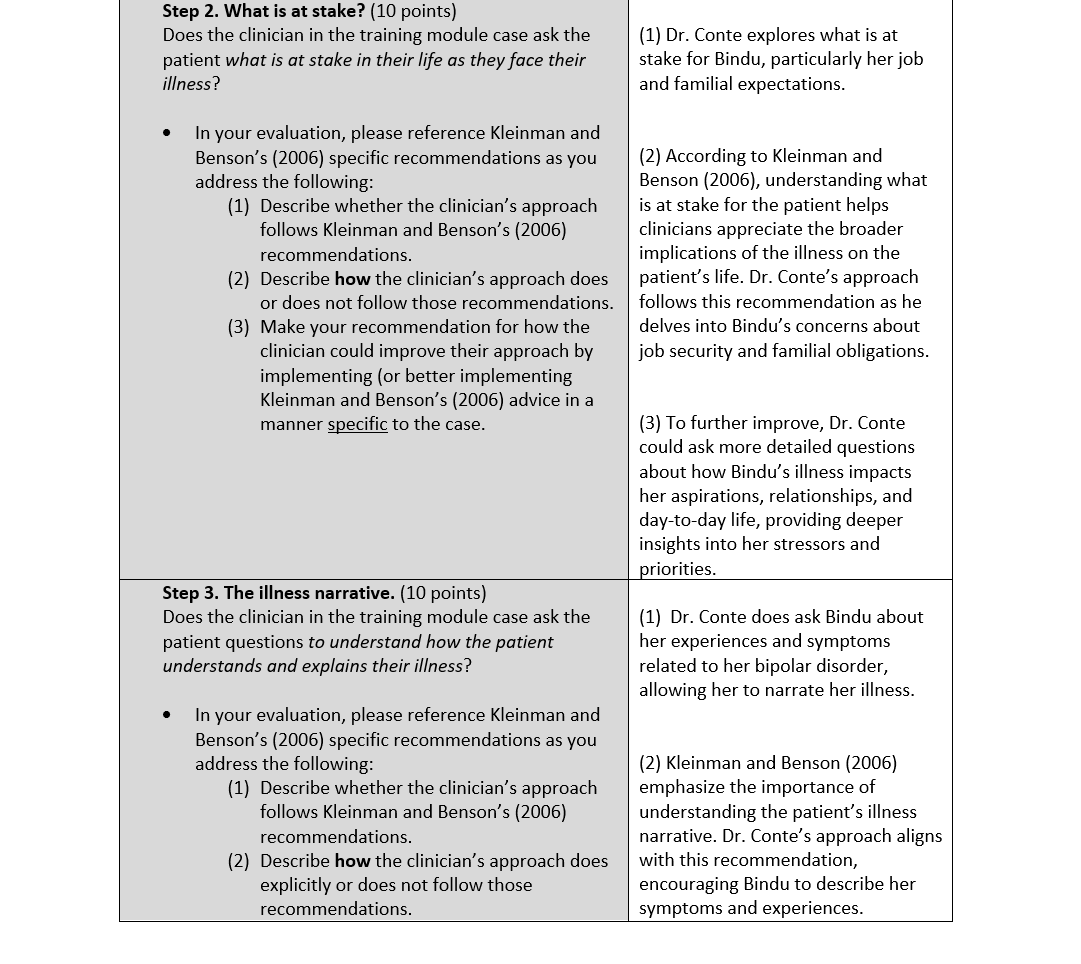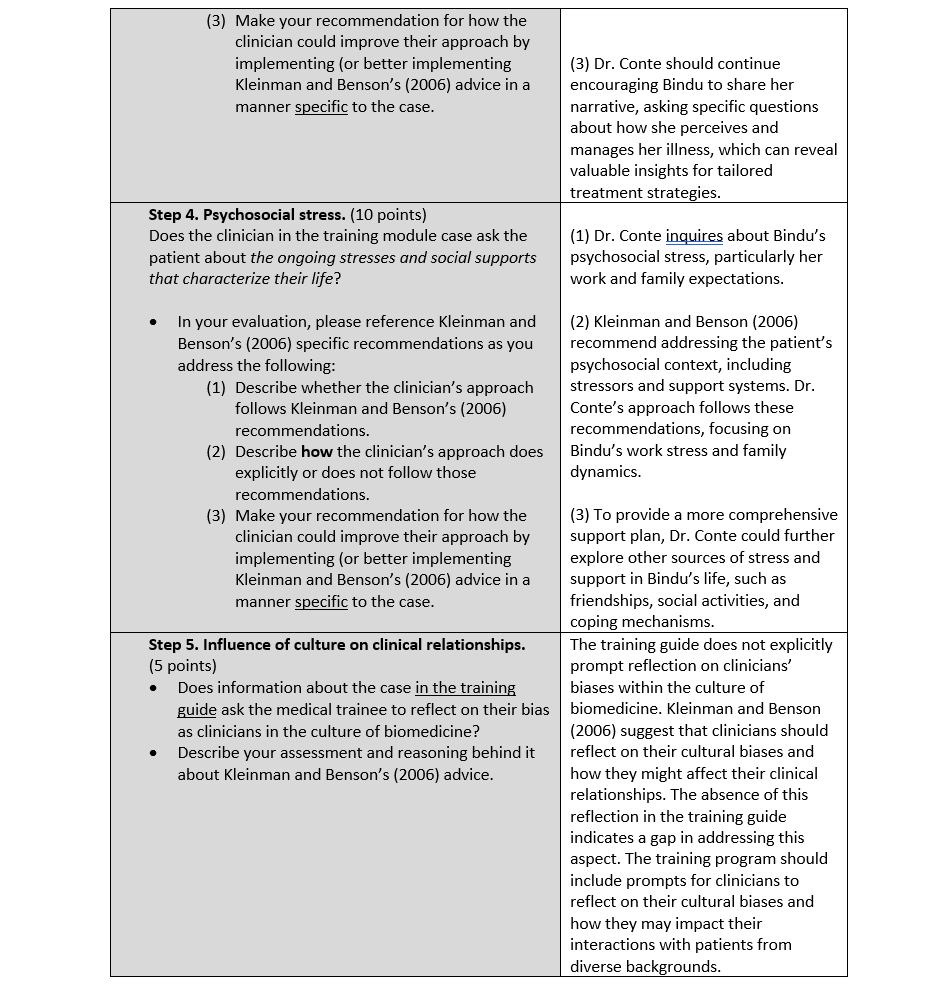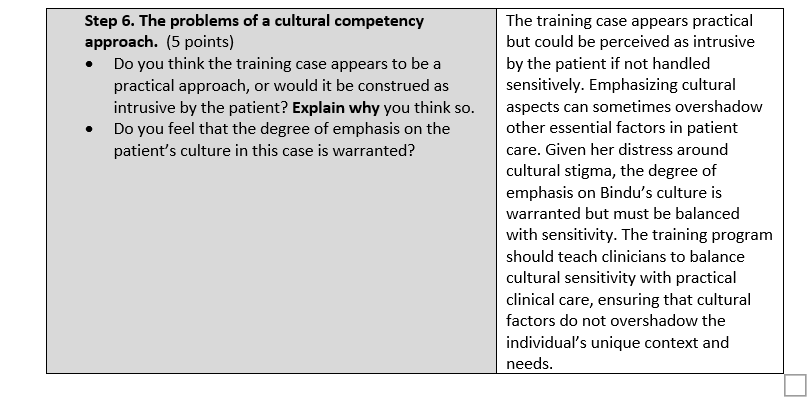Here you can read our FREE Ultimate Guide on ASB 462 Module 5 Assignment: Mental Illness and Cultural Competencies and see its solution.
Instructions of ASB 462 Module 5 Assignment
Background:
Medical anthropologists frequently serve as consultants to biomedical clinicians who wish to better understand their patients’ cultures in order to provide the best possible care. In this assignment, you will pretend to be a medical anthropologist evaluating a cultural competency training program for clinicians who treat mental illness. You first will read an article co-authored by Arthur Kleinman (medical anthropologist and psychiatrist) and Peter Benson (a sociocultural anthropologist) that critiques cultural competency approaches and outlines specific ways to improve them. Next, you will choose one of three vignette cases presented in a cultural competency training program designed to educate clinicians about the stigma associated with mental illness among Asian Americans. Following the provided prompts, you will use Kleinman and Benson’s approach to conduct an assessment of the training program and suggest recommendations for improvement that will enable sensitivity to cultural differences without making errors common to cultural competency approaches.
Instructions:
(1) Read through these instructions to the end before you get started.
(3) Select one of the three cases below in the cultural competency training module Saving Face: Recognizing and Managing the Stigma of Mental Illness in Asian Americans and watch the video clip links to an external site. below (https://ethnomed.org/clinical/mental-health/SavingFace.flv/viewLinks to an external site.) and read the associated case information in the facilitator (training) guide.
(a) Case #1: Indian-American Case (starts at 3:40 in the video, p. 10–13 in the guide.)
(b) Case #2: Vietnamese-American Case (starts at 25:37 in the video, p. 15–19 in the guide.)
(c) Case #3: Filipino-American Case (starts at 49:44 in the video, p. 20–24 in the guide.)
(4) Download and complete the Module 5 Assignment Answer Sheet
Actions
. Turn in the completed assignment sheet. Title your assignment using LastnameFirstname_Module5Assignment.doc and ensure your file is a .doc, .docx, .txt, or .pdf. Click the Submit Assignment button above to submit.
Step-By-Step Guide ASB 462 Module 5 Assignment: Mental Illness and Cultural Competencies
Introduction to ASB 462 Module 5 Assignment
In the ASB 462 Module 5 Assignment: Mental Illness and Cultural Competencies, you will assume the role of a medical anthropologist evaluating a cultural competency training program for clinicians treating mental illness. Your task involves reading an article by Arthur Kleinman and Peter Benson, selecting and analyzing a case study from a training module, and applying Kleinman and Benson’s explanatory models to assess and provide recommendations for the training program. This How-To ASB 462 Guide will provide clear, step-by-step instructions to help you complete the assignment effectively.
Select one of the three cases below in the cultural competency training module Saving Face: Recognizing and Managing the Stigma of Mental Illness in Asian Americans. Watch the video clip and read the associated case information in the facilitator guide. (a) Case #1: Indian American Case (starts at 3:40 in the video, p. 10-13 in the guide). (b) Case #2: Vietnamese American Case (starts at 25:37 in the video, p. 15-19 in the guide). (c) Case #3: Filipino-American Case (starts at 49:44 in the video, p. 20-24 in the guide)
Choosing and Analyzing the Case Study
To start the ASB 462 Module 5 Assignment: Mental Illness and Cultural Competencies, we will select a case from the training module “Saving Face: Recognizing and Managing the Stigma of Mental Illness in Asian Americans.”
I am choosing case one, “Indian American.”
- Select a case: Choose one of the three vignette cases (Indian American, Vietnamese American, Filipino-American) from the cultural competency training module “Saving Face: Recognizing and Managing the Stigma of Mental Illness in Asian Americans.”
- Watch the video clip and read the guide: Carefully watch the associated video clip and read the case information provided in the facilitator guide. Note down key points and observations.
Step 1: Ethnic identity. (10 points) Does the clinician in the training module case ask the patient about their ethnic identity? In your evaluation, please reference Kleinman and Benson’s (2006) specific Recommendations as you address the following: (1) Describe whether the clinician’s approach follows Kleinman and Benson’s (2006) recommendations. (2) Describe how the clinician’s approach does or does not follow those recommendations. (3) Make your recommendation for how the clinician could improve their approach by implementing (or better implementing) Kleinman and Benson’s (2006) advice in a manner specific to the case.
Ethnic Identity
For the first step of the ASB 462 Module 5 Assignment: Mental Illness and Cultural Competencies, we will discuss different aspects of Kleinman and Benson’s approach.
- Evaluation: Determine if the clinician in the case asks the patient about their ethnic identity.
- Analysis: Compare the clinician’s approach with Kleinman and Benson’s recommendations. Does it align or diverge?
- Recommendation: Suggest how the clinician could improve their approach by implementing Kleinman and Benson’s advice.
Example

Step 2. What is at stake? (10 points) Does the clinician in the training module case ask the patient what is at stake in their life as they face their illness? In your evaluation, please reference Kleinman and Benson’s (2006) specific recommendations as you address the following: (1) Describe whether the clinician’s approach follows Kleinman and Benson’s (2006) recommendations. (2) Describe how the clinician’s approach does or does not follow those recommendations. (3) Make your recommendation for how the clinician could improve their approach by implementing (or better implementing Kleinman and Benson’s (2006) advice in a manner specific to the case.
What is at Stake?
Next, we will explore if the clinician in the training module case asks the patient what is at stake in their life as they face their illness.
- Evaluation: Check if the clinician asks the patient about the significant stakes in their life concerning their illness.
- Analysis: Assess how well the clinician’s approach matches Kleinman and Benson’s recommendations.
- Recommendation: Improve the clinician’s approach based on Kleinman and Benson’s guidelines.
Example

Step 3. The illness narrative. (10 points) Does the clinician in the training module case ask the patient questions to understand how the patient understands and explains their illness? In your evaluation, please reference Kleinman and Benson’s (2006) specific recommendations as you address the following: (1) Describe whether the clinician’s approach follows Kleinman and Benson’s (2006) recommendations. (2) Describe how the clinician’s approach does explicitly or does not follow those recommendations. (3) Make your recommendation for how the clinician could improve their approach by implementing (or better implementing Kleinman and Benson’s (2006) advice in a manner specific to the case.
The Illness Narrative
Next, we will discuss different aspects of understanding how the patient understands and explains their illness.
- Evaluation: See if the clinician asks the patient to explain their understanding of their illness.
- Analysis: Evaluate the clinician’s approach against Kleinman and Benson’s suggestions.
- Recommendation: Provide advice on how the clinician can better implement the recommendations.
Step 4. Psychosocial stress. (10 points) Does the clinician in the training module case ask the patient about the ongoing stresses and social supports that characterize their life? In your evaluation, please reference Kleinman and Benson’s (2006) specific recommendations as you address the following: (1) Describe whether the clinician’s approach follows Kleinman and Benson’s (2006) recommendations. (2) Describe how the clinician’s approach does explicitly or does not follow those recommendations. (3) Make your recommendation for how the clinician could improve their approach by implementing (or better implementing Kleinman and Benson’s (2006) advice in a manner specific to the case.
Psychosocial Stress
This ASB 462 Module 5 Assignment: Mental Illness and Cultural Competencies step revolves around ongoing stresses and social supports that characterize patients’ lives.
- Evaluation: Consider whether the clinician inquires about the patient’s psychosocial stress and support systems.
- Analysis: Compare the clinician’s method with the recommended approach by Kleinman and Benson.
- Recommendation: Advice on enhancing the clinician’s approach to better address the patient’s psychosocial context.
Example

Step 5. Influence of culture on clinical relationships. (5 points) Does information about the case in the training guide ask the medical trainee to reflect on their bias as clinicians in the culture of biomedicine? Describe your assessment and reasoning behind it about Kleinman and Benson’s (2006) advice.
Influence of Culture on Clinical Relationships
Here, we will explore the influence of culture on clinical relationships.
- Evaluation: Assess if the training guide asks the clinician to reflect on their own biases within the culture of biomedicine.
- Analysis: Reflect on Kleinman and Benson’s advice regarding clinician biases.
- Recommendation: Suggest ways the training could better incorporate this reflective practice.
Step 6. The problems of a cultural competency approach. (5 points) Do you think the training case appears to be a practical approach, or would it be construed as intrusive by the patient? Explain why you think so. Do you feel that the degree of emphasis on the patient’s culture in this case is warranted?
The Problems of a Cultural Competency Approach
Here, we will discuss the problems of a cultural competency approach.
- Evaluation: Analyze whether the patient’s training case seems practical or intrusive.
- Analysis: Discuss if the emphasis on the patient’s culture is appropriate.
- Recommendation: Provide recommendations on balancing cultural sensitivity with practical clinical care.
Example

Closing
Completing the ASB 462 Module 5 Assignment: Mental Illness and Cultural Competencies will enhance your understanding of the complexities involved in cultural competency in clinical settings. By applying Kleinman and Benson’s recommendations, you will develop a nuanced approach to evaluating and improving cultural competency training programs, ensuring more culturally sensitive and effective patient care. By following this How-To Owlisdom Guide, you will be able to assess training programs critically and offer well-informed recommendations, fostering better clinician-patient relationships and improving healthcare outcomes in culturally diverse settings.





